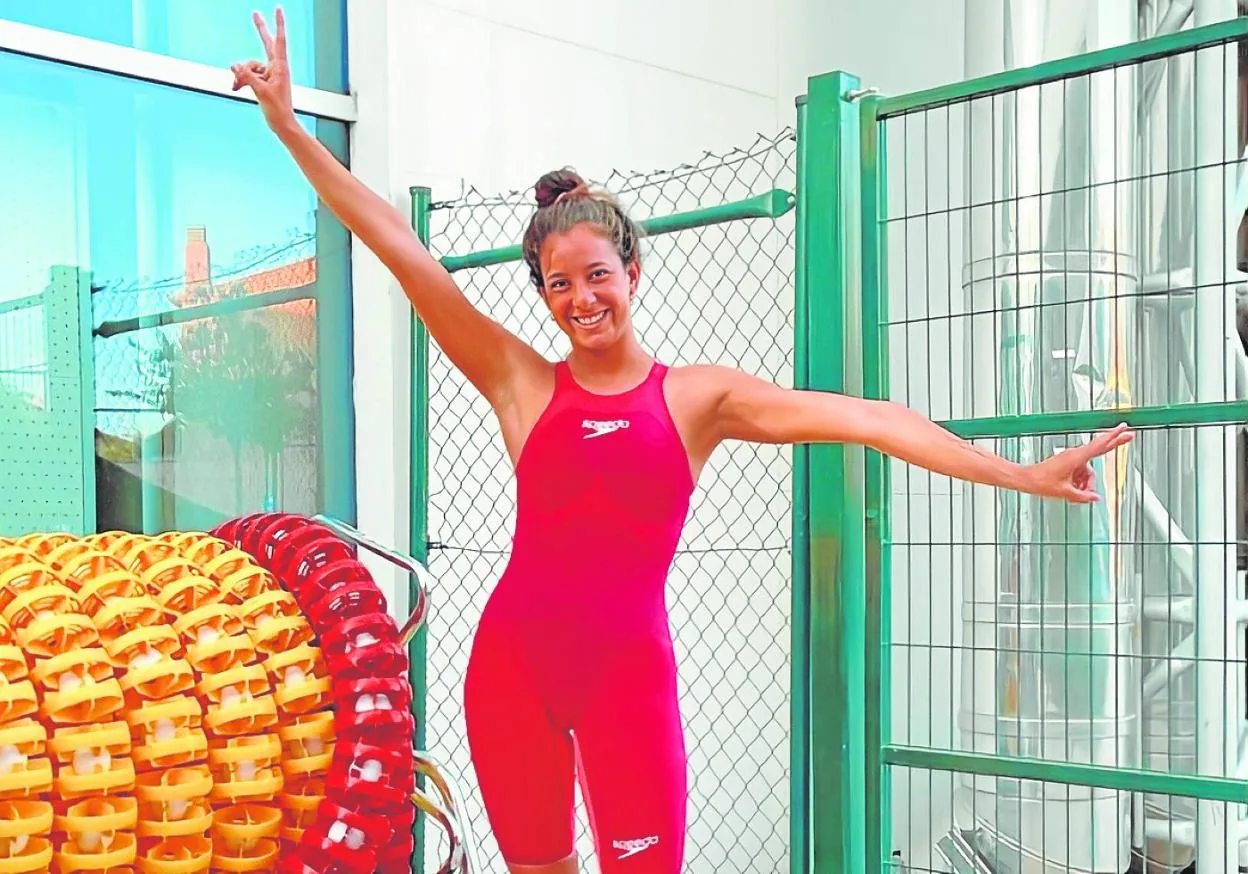'I compete better when the pressure's off; I know how far I can go and my limitations'
María de Valdés. The Fuengirola swimmer has chalked up three national titles and is now training for the European competition before taking a break
MARINA RIVAS
MALAGA.
Friday, 29 July 2022
María de Valdés, 23, has achieved what she wanted. The Fuengirola swimmer had not been aiming for these results when she started the year; she just wanted to be able to smile again after the disappointment of just missing out on the Tokyo Olympics. But thanks to her hard work she has chalked up a historic season: Spanish champion in 5 and 10 kilometres open water; 5th and 10th places in the World Championships; and now, in the Spanish Championships, a triple victory in 400, 800 and 1,500 metres freestyle in the pool.
-Did you expect this triple win when you went to the championships? It's true that you were the favourite, but this success is a first.
-I didn't expect it, no. It's the only championship in which I've got three golds, so I can't complain (laughs).
"This has been a good year and I've made the most of it to get up to speed to try for the Games." "Grants and prize money motiviate you to keep working towards your goals"
-Do you remember your first national medal?
-I don't remember how many I have in open water and pool, but the first one in the pool was 400 metres freestyle.
-Who do you dedicate your wins to?
-To my whole family, because I go for a long time without seeing them and this is theirs too, so they can see how all they're doing for me is bearing fruit. Also to my coach, Jesús de la Fuente.
-It is true that these Nationals have been marked by several absences or swimmers in poor form. After the Games, some swimmers, such as Paula Ruiz and Jimena Blanco, have treated this year as one of recovery rather than competition. It that so?
-Yes, but Paula Otero was there.
-As well as the positions, you have also achieved good times. There are races in which you beat your closest rival by ten seconds...
-Yes, the truth is that I hadn't expected to get such good times. I'm especially happy with the 400 metres; I was never that comfortable with that distance.
-Do you feel that this year you are turning a page?
-Yes, that was the idea. It could have turned out well, or not, but luckily things are going well. I had also seen the year as a transition, but I've made the most of it to prepare for the next Games.
-So next year you start the dizzying Olympic qualification period again?
-Yes, the first three open water places are awarded in the World Championships in Fukuoka, and then the first 13 qualify in the 2024 Championships. But I want to take it one season at a time.
-I hear you've been coughing a lot; you were allergic to chlorine if I remember rightly.
-Yes, and last weekend there was a lot of chlorine.
-Does that affect your competition?
-Yes, but it's being treated with pills, and I think it's working well when I compete; but when there's a lot of chlorine I move away from the pool as soon as I can.
-This is an intense year, and you've still got a big test left: the European open waters competition...
-Yes, now I'm going to the Sierra Nevada to train, and I hope to end the season well. That has become my second home; I like how I train there and how I develop physically and it makes me tougher psychologically in the water.
-Do you aim to beat your own best times in the Europeans?
-I just aim to to the best I can, without putting on the pressure. I'll try to be up with the best.
-Looking from outside, it seems that you perform much better when the pressure's off, like in the year after the Olympics.
-Definitely, without the pressure I compete better. I know how far I can go and my limitations; I don't need anyone to tell me what I have to do.
-I imagine there's a lot of psychological work in this maturing period, especially with the hard time you had when you just missed out on Tokyo...
-Yes, my psychologist is helping a lot; she's part of my team: coach, psychologist, physiotherapist... She helps me look at situations differently.
-After as well as working with all these professionals, you train every day and also study. Do you find it hard to juggle your everyday commitments?
-Now I'm studying Primary Education but next year I want to change to Psychology and focus on sport. It's difficult to adapt training and studies, but you can always find a gap; at weekends I get ahead.
-The world is conscious of the financial difficulties within minority sports such as swimming. How do you get by?
-I have grants from the Concello de Coruña, the Xunta de Galicia and the Club Liceo as well as one from the Spanish Olympic Committee. I also have a university grant from the UCAM. And for finishing fifth in the world, the International Federation gives you a cash prize. All these things help motivate you to keep working towards your goals.
